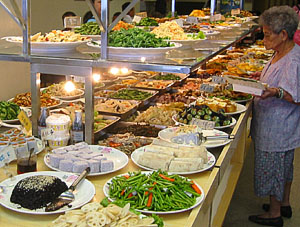Buddhist cuisine: Difference between revisions
reformatted first sentence. removed 'literally pure dishes' as this is incorrect. (zhai has no use as 'pure'), a bit more munging |
See also: -> ==Related topics== (as per guide to layout) |
||
| Line 22: | Line 22: | ||
Buddhist vegetarian restaurants can be profitable businesses because the material cost is much cheaper than meat, but the dishes are sometimes priced as if they were made of real meat. Also, particularly in [[Taiwan]] and [[Hong Kong]] there are many Buddhist vegetarians, ensuring a constant supply of customers. |
Buddhist vegetarian restaurants can be profitable businesses because the material cost is much cheaper than meat, but the dishes are sometimes priced as if they were made of real meat. Also, particularly in [[Taiwan]] and [[Hong Kong]] there are many Buddhist vegetarians, ensuring a constant supply of customers. |
||
==Related topics== |
|||
See also: |
|||
* [[Buddhism in China]] |
* [[Buddhism in China]] |
||
* [[Chinese cuisine]] |
* [[Chinese cuisine]] |
||
Revision as of 04:29, 19 November 2003
Buddhist cuisine is known as 齋菜 (pinyin zhāi caì) among Chinese.
When picking up the menu in a Chinese Buddhist vegetarian restaurant, one may wonder if the menu is misprinted. One will find the menu listing dishes such as chicken, duck, beef, lamb, pork, fish etc in addition to the vegetable dishes. All these meat dishes are made of imitation meat. Some of these taste like the real thing.
Due to religious beliefs, many Buddhists do not eat animal products because they don't want to cause unnecessary suffering to other beings. Others interpret the precept against killing to mean human beings and thus indulge in omnivorous behavior. Even Buddhist monks in some parts of the world have been known to eat meat.
Many adherents allow milk and (unfertilized) eggs in their diet, but some strict believers do not. Additionally, such beliefs may be due to objections about the environment in which the animals producing such products are raised. Some Buddhist vegetarians, particuarly from China and Vietnam, don't eat onion, garlic or leek either. Buddhist cuisine is not necessarily vegan.
(Note: someone need to expand on the Buddhist rules on dietary restrictions.)
In order to cater to those Buddhist customers who have missed the meat dishes, Buddhist vegetarian chefs become extremely creative in imitating meat using gluten, tofu, agar and other plant products. Gluten and tofu are very versatile material, because they can be manufactured into various consistencies and textures. With the proper seasoning and flavour, they can mimic various kinds of meat quite closely. Many soy (mainly those fermented) products provide the meaty favour. Pure vegetable dishes in these restaurants are not different from those offered in regular Chinese restaurant, perhaps with the exception that lard is not used. Occasional customers to Buddhist restaurants have been known to forget about pure vegetable dishes and order only imitation meat dishes due to novelty.
Buddhist vegetarian restaurants can be profitable businesses because the material cost is much cheaper than meat, but the dishes are sometimes priced as if they were made of real meat. Also, particularly in Taiwan and Hong Kong there are many Buddhist vegetarians, ensuring a constant supply of customers.

